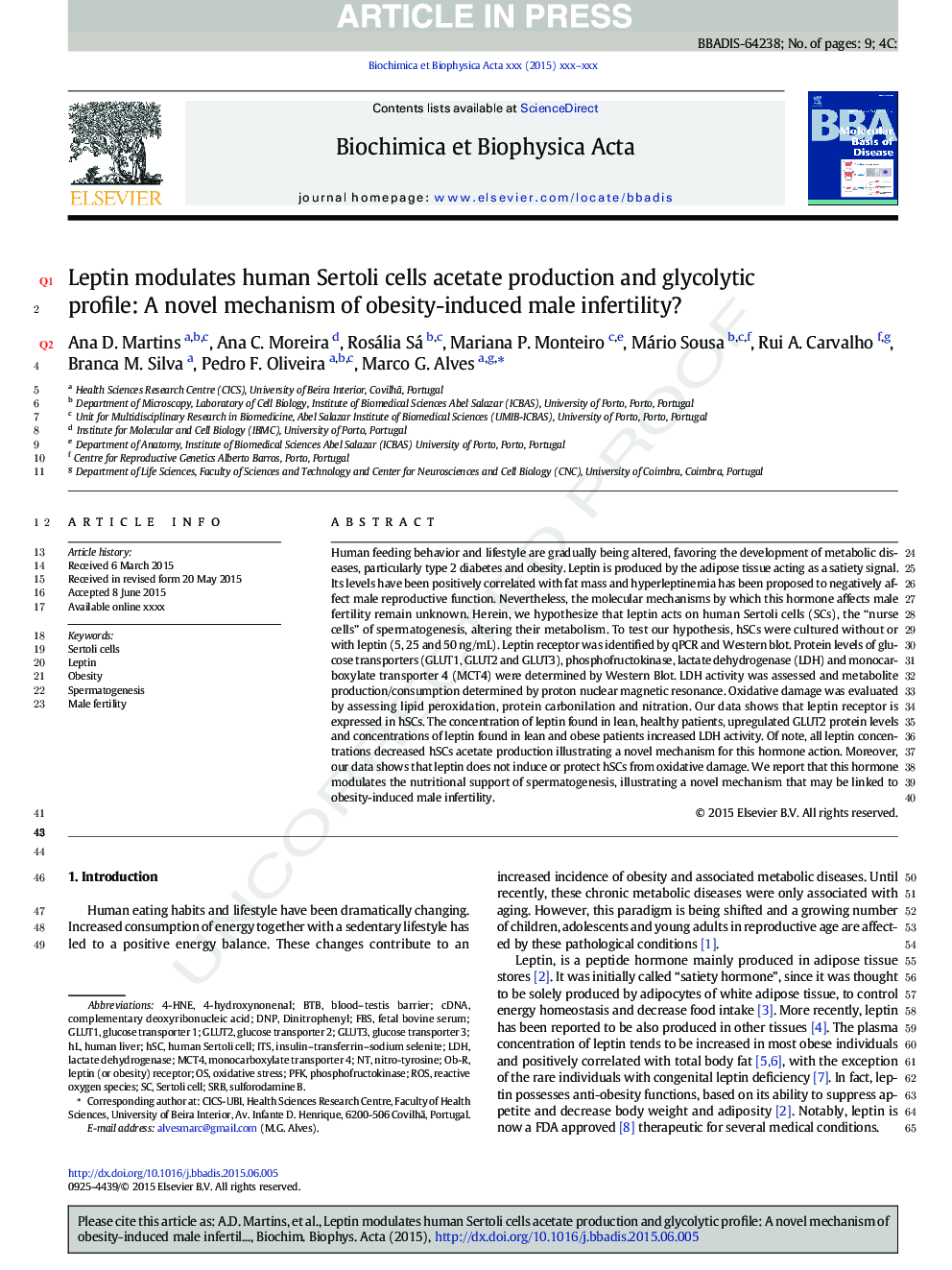| کد مقاله | کد نشریه | سال انتشار | مقاله انگلیسی | نسخه تمام متن |
|---|---|---|---|---|
| 8259697 | 1534643 | 2015 | 9 صفحه PDF | دانلود رایگان |
عنوان انگلیسی مقاله ISI
Leptin modulates human Sertoli cells acetate production and glycolytic profile: a novel mechanism of obesity-induced male infertility?
ترجمه فارسی عنوان
لپتین تولید سلول های سرتولی سلول های انسانی و پروتئین گلیکولیت را مدول می کند: یک مکانیسم جدید ناباروری مردانه ناشی از چاقی؟
دانلود مقاله + سفارش ترجمه
دانلود مقاله ISI انگلیسی
رایگان برای ایرانیان
کلمات کلیدی
HSCGLUT2BTBGLUT1GLUT3DNPPFKSRBMCT4ITSOb-RFBS4-HNEMonocarboxylate transporter 44-hydroxynonenalcDNA - cDNAROS - ROSSpermatogenesis - اسپرماتوژنزcomplementary deoxyribonucleic acid - اسید دز اکسید ریبونوکلئیک مکملglucose transporter 3 - انتقال دهنده گلوکز 3male fertility - باروری مردانهOxidative stress - تنش اکسیداتیوDinitrophenyl - دینیتروفنیلfetal bovine serum - سرم جنین گاوSertoli cell - سلول سرتولیSertoli cells - سلولهای SertoliPhosphofructokinase - فسفوفروتکتینازlactate dehydrogenase - لاکتات دهیدروژناز LDH - لاکتات دهیدروژناز به صورت مختصر شده LDH Leptin - لپتین blood–testis barrier - مانع خونبندیObesity - مرض چاقیNitro-tyrosine - نیترو تیروزینHuman liver - کبد انسانیglucose transporter 1 - گلوکز 1glucose transporter 2 - گلوکز 2Reactive oxygen species - گونههای فعال اکسیژن
موضوعات مرتبط
علوم زیستی و بیوفناوری
بیوشیمی، ژنتیک و زیست شناسی مولکولی
سالمندی
چکیده انگلیسی
Human feeding behavior and lifestyle are gradually being altered, favoring the development of metabolic diseases, particularly type 2 diabetes and obesity. Leptin is produced by the adipose tissue acting as a satiety signal. Its levels have been positively correlated with fat mass and hyperleptinemia has been proposed to negatively affect male reproductive function. Nevertheless, the molecular mechanisms by which this hormone affects male fertility remain unknown. Herein, we hypothesize that leptin acts on human Sertoli cells (hSCs), the “nurse cells” of spermatogenesis, altering their metabolism. To test our hypothesis, hSCs were cultured without or with leptin (5, 25 and 50Â ng/mL). Leptin receptor was identified by qPCR and Western blot. Protein levels of glucose transporters (GLUT1, GLUT2 and GLUT3), phosphofructokinase, lactate dehydrogenase (LDH) and monocarboxylate transporter 4 (MCT4) were determined by Western Blot. LDH activity was assessed and metabolite production/consumption determined by proton nuclear magnetic resonance. Oxidative damage was evaluated by assessing lipid peroxidation, protein carbonilation and nitration. Our data shows that leptin receptor is expressed in hSCs. The concentration of leptin found in lean, healthy patients, upregulated GLUT2 protein levels and concentrations of leptin found in lean and obese patients increased LDH activity. Of note, all leptin concentrations decreased hSCs acetate production illustrating a novel mechanism for this hormone action. Moreover, our data shows that leptin does not induce or protect hSCs from oxidative damage. We report that this hormone modulates the nutritional support of spermatogenesis, illustrating a novel mechanism that may be linked to obesity-induced male infertility.
ناشر
Database: Elsevier - ScienceDirect (ساینس دایرکت)
Journal: Biochimica et Biophysica Acta (BBA) - Molecular Basis of Disease - Volume 1852, Issue 9, September 2015, Pages 1824-1832
Journal: Biochimica et Biophysica Acta (BBA) - Molecular Basis of Disease - Volume 1852, Issue 9, September 2015, Pages 1824-1832
نویسندگان
Ana D. Martins, Ana C. Moreira, Rosália Sá, Mariana P. Monteiro, Mário Sousa, Rui A. Carvalho, Branca M. Silva, Pedro F. Oliveira, Marco G. Alves,
